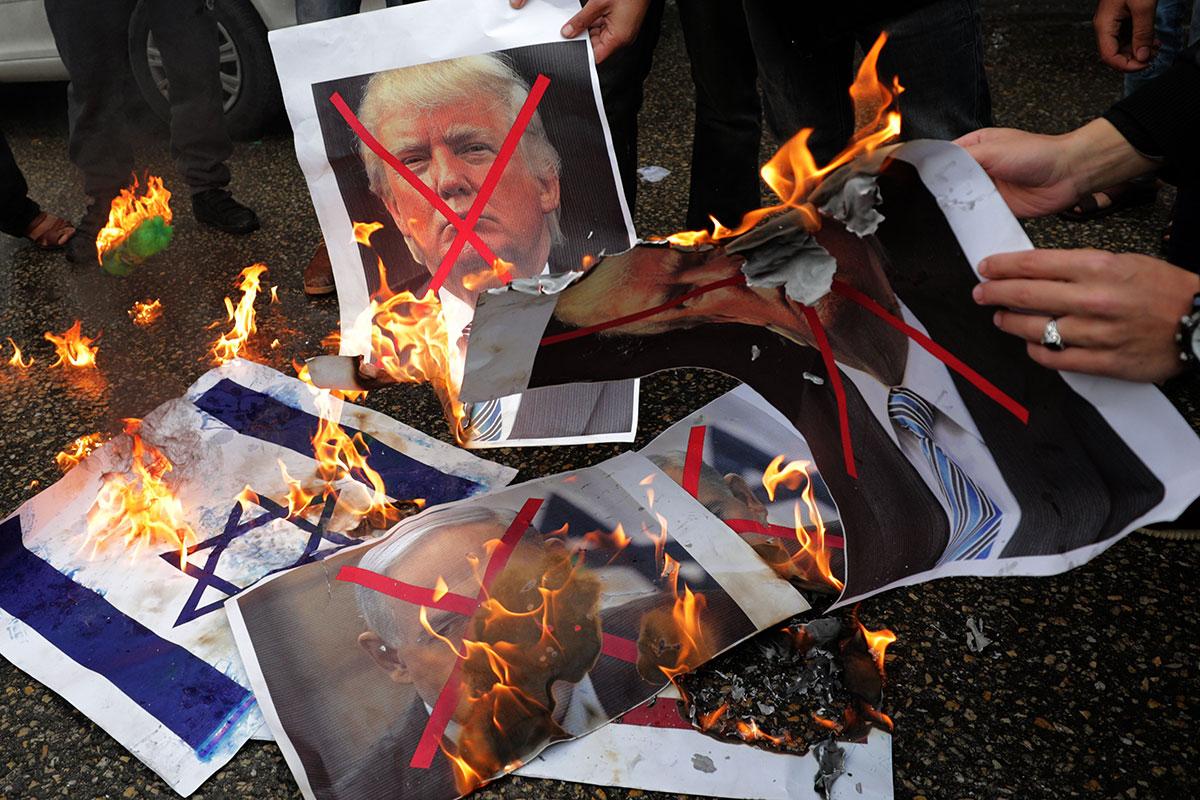Jerusalem embassy: Donald Trump's decision on Israel will seriously harm US influence in the Muslim world
Analysis: Even outside the Middle East, the reaction to Trump's policy shift has been overwhelmingly negative

The expected announcement by President Trump that the US recognises Jerusalem as the capital of Israel and will move the US embassy there could mark a critical stage in the reduction of US influence in the world. Seldom, if ever, has such an important US policy initiative been so universally criticised or condemned by almost every country in the world.
President Trump has previously provoked anger in important countries allied to the US since the Second World War such as the UK, Japan, Australia and Germany, but they have tried to continue their past relationship and ignore or play down Mr Trump’s explosive tweets and departure from international treaties. But this time round expressions of extreme disagreement are more than usually mixed with scorn and bemusement at a move which may help Mr Trump in US domestic politics but will seriously damage US political primacy in the region. Even steadfast US allies do not want to become collateral damage.
The fury is greatest in Muslim states: the Turkish government’s spokesman said on Wednesday said that the US decision to recognise Jerusalem as the capital of Israel will plunge the region and the world into endless conflict.Deputy Prime Minister Bekir Bozdag said on Twitter that “declaring Jerusalem a capital is disregarding history and the truths in the region, it is a big injustice/cruelty, short-sightedness, foolishness/madness, it is plunging the region and the world into a fire with no end in sight.”
Turkish President Recep Tayyip Erdogan said President Trump’s action would be a “red line for Turkey” and could lead to Ankara cutting diplomatic ties with Israel.
Turkey’s relations with the US have been in decline for several years, but even Saudi Arabia, which Mr Trump visited and has gone out of his way to praise and support, was very negative about his reversal of traditional US policy on Jerusalem. A Saudi official in Riyadh was quoted as saying that “the recognition will have very serious implications and will be provocative to all Muslims”. It went on to say that the US move would damage its ability of the US to reach “a just solution for the Palestinian question” and the status of Jerusalem should only be decided in a final settlement between Israel and the Palestinians.
Saudi Arabia has cultivated the US as an ally against Iran, but the expected US action will make it impossible to even pretend that “the peace process” is going anywhere. This has been true for years, but the pretence that it was and that the US was a fair-minded arbitrator on Israel-Palestinian issues enabled Muslim states like Saudi Arabia to say that they were keeping close to the US in order to help the Palestinians.
The US recognition of Jerusalem as Israel’s capital and the long term move of US embassy to Jerusalem affects little on the ground, But it may have a profound symbolic impact because many Muslims will see the US action as posing an increased threat to the Islamic holy sites in Jerusalem, the Haram esh-Sharif, on which stands the Dome of the Rock, and al-Aqsa mosque. Their fate will concern and possibly mobilise many of the 1.5 billion Muslims who make up 22 per cent of the world’s population.
Outside the Muslim world, the response to President Trump’s proposed action has been less harsh, but relentlessly negative from Pope Francis in the Vatican to Bolivia and Beijing. Israel captured East Jerusalem in the 1967 and later annexed it, but its sovereignty over the whole of Jerusalem has not been recognised by other states.
The Trump administration says that recognition of Jerusalem as Israel’s capital simply accepts the reality that its seat of government is there in the shape of the prime minister’s office, the Knesset and Israeli Supreme Court. But in practice Mr Trump is endorsing Israeli settlement policy in East Jerusalem and the West Bank. These have made the so-called “two state solution” for the Israel-Palestinian a fiction as the Palestinians are pushed into smaller and smaller enclaves separated from each other.
Mr Trump’s actions will be a serious blow to US influence in the Muslim world and particularly in the Middle East. They will persuade other states around the world that US foreign policy has imploded and will in future be determined by Mr Trump’s policy of self-isolation and political priorities at home. The US ability to shape events internationally is becoming increasingly limited.
Join our commenting forum
Join thought-provoking conversations, follow other Independent readers and see their replies
Comments
Bookmark popover
Removed from bookmarks